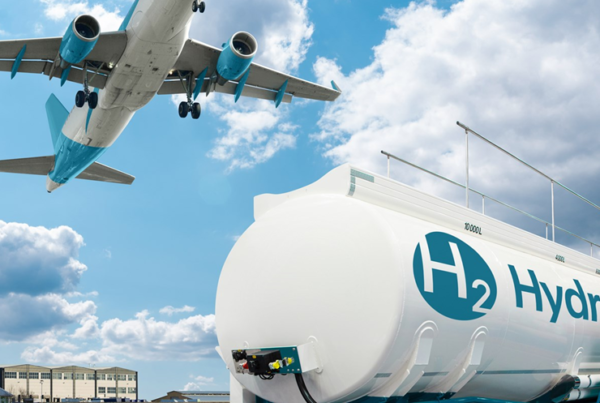
Natural gas technology and derivative products first step as part of transformational fuel strategy to help reduce carbon footprint, diversify fuel markets, and provide a path to net-zero emissions
PITTSBURGH — Call it a transformational fuel strategy for the transportation industry to lower costs, reduce emissions, and create jobs – with Pittsburgh leading the way.
Pittsburgh International Airport (PIT) officials announced a new phase of their ongoing partnership with locally-based natural gas exploration, production, midstream, and technology company CNX Resources Corporation (NYSE: CNX) on Friday aimed at further reducing carbon emissions in the transportation industry and related sectors – by using natural gas produced at the airport and converted into alternative fuel with CNX proprietary technology.
“We feel that natural gas and derivative products provide a path for the transportation industry both to reduce carbon emissions in the short-term while working toward a goal of net-zero in the long-term as hydrogen and other potential solutions mature,” said Christina Cassotis, CEO, Pittsburgh International Airport. “This is Pittsburgh innovation at work. We believe this strategy can have a global impact.”
The agreement comes on the heels of an announcement earlier this week from Pennsylvania Gov. Tom Wolf about a statewide initiative to secure a hydrogen hub and large-scale carbon storage system in Pennsylvania, bringing further partnership opportunities to PIT.
CNX has developed proprietary technology to cost-effectively convert on-site dry natural gas into liquified natural gas (LNG), compressed natural gas (CNG), and electricity for various uses including as a hydrogen feedstock. These technologies will reduce local emissions and further reduce operating costs at the airport.
The strategy also envisions a sustainable fuel hub at PIT utilizing locally sourced, lower-cost, lower-carbon intensity LNG and CNG fueling depots for airlines, transit, cargo, fleet, military, and other energy-intensive business purposes.
CNX President and CEO Nick DeIuliis commented, “CNX views its innovative public-private partnership with PIT as the beachhead market to showcase this technology, and the associated economic development opportunities, through on-site development of low-cost and lower-carbon intensity natural gas derivative products.” Mr. DeIuliis continued, “We will produce, process, and consume these natural gas-based products locally first, and, in doing so, unleash countless downstream economic opportunities and help jumpstart the hydrogen economy, leverage the region’s unrivalled work ethic, create family-sustaining jobs, better the region’s underserved communities, and revitalize Appalachia’s middle class in a new, lower carbon economic ecosystem.”
As part of the agreement, CNX will develop the Utica shale on airport property representing the first wells from this formation completed and brought into production in Allegheny County. The Utica shale yields a dry gas which is more easily converted into LNG and CNG alternative fuels and hydrogen.
The airport will work with CNX to identify local, end-use opportunities that would benefit from using natural gas derivative products to reduce emissions.
CNX began its natural gas development-related activities at the airport in 2014, bringing its Marcellus shale wells into production in 2016 with the airport sharing the resulting revenue. The airport would similarly collect revenue from new drilling within the new agreement.
Pittsburgh International Airport is already leading the way in energy innovation. Last June, the airport became the first in the world to be completely powered with its own microgrid, fueled by natural gas and more than 10,000 solar panels. Officials are planning to double the size of the solar field, which is built atop an old landfill.
Airport officials noted that the microgrid alone is forecast to reduce emissions by about 8.2 million pounds of carbon dioxide per year within the region.
About Allegheny County Airport Authority:
Allegheny County Airport Authority, which manages Pittsburgh International Airport (PIT) and Allegheny County Airport (AGC), is committed to transforming Pittsburgh’s airports to reflect and serve the community, inspire the industry, and advance the region’s role as a world leader. PIT was named by Fast Company magazine as One of the Most Innovative Companies in the World as well as a finalist in its World Changing Ideas awards, both in 2020. PIT’s first-of-its-kind microgrid has won numerous awards for resiliency and sustainability. For more information, visit www.flypittsburgh.com.
About CNX Resources Corporation:
CNX Resources Corporation (NYSE: CNX) is unique. We are a premier natural gas development, production, midstream, and technology company centered in Appalachia, one of the most energy abundant regions in the world. With the benefit of a 158-year regional legacy, substantial asset base, leading core operational competencies, technology development and innovation, and astute capital allocation methodologies, we responsibly develop our resources and deploy free cash flow to create long-term per share value for our shareholders, employees, and the communities where we operate. As of December 31, 2021, CNX had 9.63 trillion cubic feet equivalent of proved natural gas reserves. The company is a member of the Standard & Poor’s Midcap 400 Index. Additional information is available at www.cnx.com.
SOURCE CNX Resources Corporation; Pittsburgh International Airport
Read the most up to date Fuel Cell and Hydrogen Industry news at FuelCellsWorks




